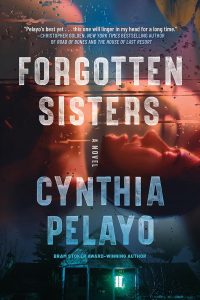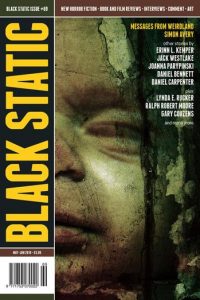Gabino Iglesias Reviews Forgotten Sisters Cynthia Pelayo
 Forgotten Sisters, Cynthia Pelayo (Thomas & Mercer 978-1-66251-391-6, $16.99, 303pp, tp) March 2024. Cover by Olga Grlic.
Forgotten Sisters, Cynthia Pelayo (Thomas & Mercer 978-1-66251-391-6, $16.99, 303pp, tp) March 2024. Cover by Olga Grlic.
Cynthia Pelayo has made a name for herself in horror by bringing to the table a mixture of horror, crime fiction, and folklore that always contains a dash of poetry and by telling stories that invariably take place in Chicago, a city that Pelayo always turns into a character in her work. Forgotten Sisters, Pelayo’s latest, delivers more of what her fans have come to expect, but its deeper, wonderfully multilayered narrative makes it Pelayo’s best novel yet.
Sisters Anna and Jennie live in an old house right next to the Chicago River. Anna has a podcast in which she digs deep into Chicago’s history and two puppies, and Jennie fixes old record players and goes on nightly walks by the river. The sisters have a strange relationship and share a haunting past, but all they have is each other. For some reason, they can’t leave their house, which is full of strange sounds and ghostly voices despite Anna’s attempts to fix the place and change its nature. To make matters worse, a lot of bodies have been found in the river, and while some people think they were all accidental drownings, there might be a serial killer on the loose. While Anna worries about Jennie’s walks by the river and Jennie worries about Anna going out with a man who contacted her because he was a fan of her podcast, two detectives are looking into the bodies being pulled from the river. They don’t have much to go on, but some things point them to the mysterious house where the sisters live, and that means the sisters’ dark past might come to light.
Forgotten Sisters is made up of two intertwined narratives. The main story occupies most of the novel and follows Anna and Jennie. We know they have a big secret and that they live in a haunted house, but the most important element about them is the depth of their relationship and the way Anna struggles to understand her sister, who speaks in riddles and has a peculiar way of seeing the world. When they’re together, the dialogue is always somewhere between emotionally charged and almost incomprehensible, thanks to Jennie. However, the mysteriousness never becomes tedious. In fact, the big secret about the sisters and Jennie’s behavior are an extra layer of cryptic weirdness that enriches the narrative and that battles with the bodies being pulled from the river for center stage. Also, Jennie’s voice allows Pelayo, an award-winning poet, to flex her poetry muscles and craft beautiful, enigmatic lines.
The second story follows the detectives. Despite the sisters living in a haunted house, this is where the true horror comes from. Ghostly voices and strange dripping sounds are creepy, but the way Pelayo leans into forensic science and her descriptions of the rotting, bloated bodies being pulled from the river are deliciously gruesome.
Besides the sisters and the detectives, the stars of this novel are the city of Chicago and its river. Pelayo, who has always had a love for the city’s history, again goes deep into it here, taking readers on a tour of the city’s past that includes some economic history, crime, and culture.
Forgotten Sisters marks Pelayo’s major press debut after years of work in small and indie presses. The writing is more self-assured, and the storytelling is top-notch. The mix of folklore, horror, crime, and history is perfectly blended, and the character development and dialogue are solid throughout the novel. For loyal fans, this is Pelayo’s best novel so far. For those unfamiliar with her work, this is the perfect introduction to an author that promises to be at the top of her genre for years to come.
Gabino Iglesias is a writer, journalist, professor, and book reviewer living in Austin TX. He is the author of Zero Saints and Coyote Songs and the editor of Both Sides. His work has been nominated to the Bram Stoker and Locus Awards and won the Wonderland Book Award for Best Novel in 2019. His short stories have appeared in a plethora of anthologies and his non-fiction has appeared in the New York Times, the Los Angeles Times, and CrimeReads. His work has been published in five languages, optioned for film, and praised by authors as diverse as Roxane Gay, David Joy, Jerry Stahl, and Meg Gardiner. His reviews appear regularly in places like NPR, Publishers Weekly, the San Francisco Chronicle, Criminal Element, Mystery Tribune, Vol. 1 Brooklyn, the Los Angeles Review of Books, and other print and online venues. He’s been a juror for the Shirley Jackson Awards twice and has judged the PANK Big Book Contest, the Splatterpunk Awards, and the Newfound Prose Prize. He teaches creative writing at Southern New Hampshire University’s online MFA program. You can find him on Twitter at @Gabino_Iglesias.
This review and more like it in the June 2024 issue of Locus.
 While you are here, please take a moment to support Locus with a one-time or recurring donation. We rely on reader donations to keep the magazine and site going, and would like to keep the site paywall free, but WE NEED YOUR FINANCIAL SUPPORT to continue quality coverage of the science fiction and fantasy field.
While you are here, please take a moment to support Locus with a one-time or recurring donation. We rely on reader donations to keep the magazine and site going, and would like to keep the site paywall free, but WE NEED YOUR FINANCIAL SUPPORT to continue quality coverage of the science fiction and fantasy field.
©Locus Magazine. Copyrighted material may not be republished without permission of LSFF.







